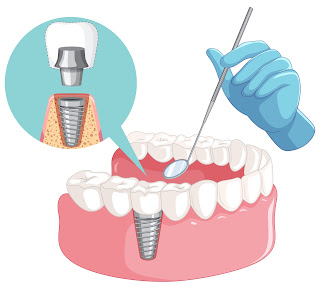Understanding the Medical Necessity of Dental Implants
Dental implants have become a widely recognized and effective solution for tooth replacement. While dental implants are often chosen for cosmetic reasons, they can also be considered medically necessary under certain circumstances. This article aims to explore the situations in which dental implant treatment in Gurgaon may be deemed medically necessary, highlighting their benefits in restoring oral function, preserving bone health, and addressing specific dental conditions.
Key Highlights
- Dental implants can be medically necessary for restoring oral function and chewing ability, especially when multiple teeth are missing or severely damaged.
- They help prevent bone loss in the jaw by stimulating the jawbone and preserving its structure, which is essential for maintaining facial aesthetics and overall oral health.
- Failed dental restorations or prosthetics can make dental implants a medically necessary solution, as they provide a durable and comfortable alternative.
- Dental implants are often required in cases of dental trauma or injury, such as severe fractures or complete tooth loss, to restore oral function, aesthetics, and confidence.
- Individuals born with congenital tooth absence can benefit from dental implants, as they address functional and aesthetic concerns, improving overall oral health and self-esteem.
- Consulting with a qualified dentist or oral surgeon is crucial to determine the medical necessity of dental implants based on individual circumstances and specific oral health needs.
Why are Dental Implants medically necessary?
Restoring Oral Function and Chewing Ability:
One of the primary reasons dental implants may be medically necessary is the restoration of oral function. When multiple teeth are missing or severely damaged, chewing ability can be significantly compromised. Dental implants provide a stable and long-lasting solution, allowing individuals to regain their ability to chew and eat a wide variety of foods. This is crucial for overall nutrition and maintaining a healthy lifestyle, making dental implants a medically necessary option for individuals with impaired chewing function.
Preventing Bone Loss and Preserving Jaw Structure:
Tooth loss can lead to bone loss in the jaw over time. The absence of tooth roots fails to stimulate the jawbone, resulting in its gradual resorption. Dental implants, however, mimic the function of natural tooth roots by integrating with the jawbone through a process called osseointegration. This stimulates the bone, prevents further deterioration, and helps preserve the overall structure of the jaw. Preserving the jawbone is not only important for dental health but also for maintaining facial aesthetics and preventing complications associated with bone loss.
Failed Dental Restorations and Prosthetics:
In cases where traditional dental restorations, such as bridges or dentures, have failed to provide satisfactory results or cause discomfort, dental implants may be considered medically necessary. Failed restorations can impede proper oral function, cause pain or irritation, and compromise the health of neighboring teeth. Dental implants offer a durable and stable solution that eliminates the issues associated with conventional restorations, providing patients with improved comfort, functionality, and oral health.
Trauma or Injury:
Dental trauma or injury, such as a severe tooth fracture or complete tooth loss (avulsion), often requires immediate intervention. In such cases, dental implants in Gurgaon can be considered medically necessary to restore oral function, aesthetics, and psychological well-being. Implants offer a reliable and long-lasting solution, ensuring that individuals regain their ability to speak, eat, and smile with confidence following a traumatic dental event.
Congenital Tooth Absence:
Some individuals may be born with congenital absences, where certain teeth fail to develop. This condition can cause functional and aesthetic concerns, affecting speech, biting, and overall oral health. Dental implants in Gurgaon can be an appropriate treatment option in such cases, allowing individuals to have missing teeth replaced and enjoy improved oral function, aesthetics, and self-esteem.
Key Takeaways
- Dental implants can be medically necessary for restoring oral function, and chewing ability, and addressing specific dental conditions.
- They help prevent bone loss in the jaw and preserve the overall structure of the jaw.
- Failed dental restorations or prosthetics may warrant the use of dental implants as a durable and comfortable alternative.
- Dental implants are often necessary in cases of dental trauma or injury to restore oral function, aesthetics, and confidence.
- Congenital tooth absence can be effectively addressed with dental implants, improving oral function, aesthetics, and self-esteem.
- Consulting with a qualified dental professional is essential to determine the medical necessity of dental implants based on individual circumstances and needs.
While dental implants are often sought after for cosmetic reasons, they can also be considered medically necessary in various situations. Whether it is restoring oral function, preventing bone loss, addressing failed restorations, treating traumatic injuries, or managing congenital tooth absence, dental implants offer significant benefits and contribute to overall oral health and well-being. However, it is important to consult with a qualified dentist in Gurgaon or oral surgeon who can assess individual cases and determine the medical necessity of dental implants based on factors such as oral health, functionality, aesthetics, and the specific needs of the patient. By understanding the medical benefits of dental implants, individuals can make informed decisions regarding their oral health and seek appropriate treatment options.

.jpg)
.jpg)

Comments
Post a Comment